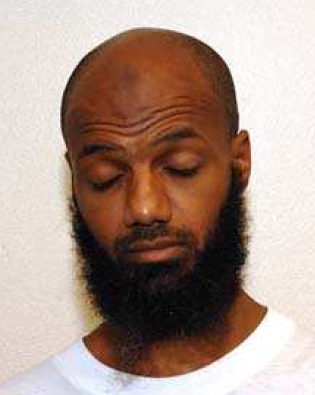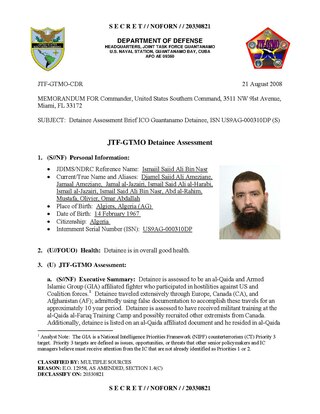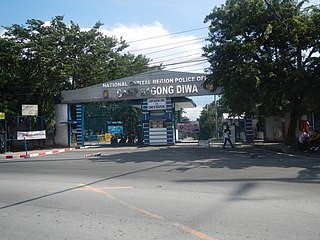Related Research Articles

Mohammed Mani Ahmad al-Qahtani is a Saudi citizen who was detained as an al-Qaeda operative for 20 years in the United States's Guantanamo Bay detention camps in Cuba. Qahtani allegedly tried to enter the United States to take part in the September 11 attacks as the 20th hijacker and was due to be onboard United Airlines Flight 93 along with the four other hijackers. He was refused entry due to suspicions that he was trying to illegally immigrate. He was later captured in Afghanistan in the Battle of Tora Bora in December 2001.

Mustafa Ahmed Adam al-Hawsawi is a Saudi Arabian citizen. He is alleged to have acted as a key financial facilitator for the September 11 attacks in the United States.
Extraordinary rendition is a euphemism for state-sponsored kidnapping in another jurisdiction and transfer to a third state. The phrase usually refers to a United States-led program used during the War on Terror, which had the purpose of circumventing the source country's laws on interrogation, detention, extradition and/or torture. Extraordinary rendition is a type of extraterritorial abduction, but not all extraterritorial abductions include transfer to a third country.
Ghost detainee is a term used in the executive branch of the United States government to designate a person held in a detention center, whose identity has been hidden by keeping them unregistered and therefore anonymous. Such uses arose as the Bush administration initiated the War on Terror following the 9/11 attacks of 2001 in the United States. As documented in the 2004 Taguba Report, it was used in the same manner by United States officials and contractors of the Joint Interrogation and Debriefing Center at the Abu Ghraib prison in Iraq in 2003–2004.
Immigration detention is the policy of holding individuals suspected of visa violations, illegal entry or unauthorized arrival, as well as those subject to deportation and removal until a decision is made by immigration authorities to grant a visa and release them into the community, or to repatriate them to their country of departure. Mandatory detention refers to the practice of compulsorily detaining or imprisoning people who are considered to be illegal immigrants or unauthorized arrivals into a country. Some countries have set a maximum period of detention, while others permit indefinite detention.

In 2005, The New York Times obtained a 2,000-page United States Army investigatory report concerning the homicides of two unarmed civilian Afghan prisoners by U.S. military personnel in December 2002 at the Bagram Theater Internment Facility in Bagram, Afghanistan, and general treatment of prisoners. The two prisoners, Habibullah and Dilawar, were repeatedly chained to the ceiling and beaten, resulting in their deaths. Military coroners ruled that both the prisoners' deaths were homicides. Autopsies revealed severe trauma to both prisoners' legs, describing the trauma as comparable to being run over by a bus. Seven soldiers were charged in 2005.
In Canada, a security certificate is a legal mechanism by which the Canadian government can detain and deport permanent residents and all other non-citizens living in Canada.
Ahcene Zemiri, also known as Hassan Zumiri, is an Algerian citizen who was for seven years a legal resident of Canada, where he lived in Montreal. He and his Canadian wife moved to Afghanistan in July 2001. They were separated when trying to leave in November 2001 and Zemiri was arrested and turned over to United States forces. He was transferred to the United States Guantanamo Bay detention camp in 2002, where he was detained for eight years without charge.

Binyam Ahmed Mohamed, also referred to as Benjamin Mohammed, Benyam Mohammed or Benyam Mohammed al-Habashi, is an Ethiopian national and United Kingdom resident, who was detained as a suspected enemy combatant by the US Government in Guantanamo Bay prison between 2004 and 2009 without charges. He was arrested in Pakistan and transported first to Morocco under the US's extraordinary rendition program, where he claimed to have been interrogated under torture.

Sami Mohy El Din Muhammed Al Hajj, aka Sami Al-Haj is a Sudanese journalist for the Al Jazeera network. In 2001, while on his way to do camera work for the network in Afghanistan, he was arrested by the Pakistani army and held in the United States Guantanamo Bay detainment camp in Cuba for over six years. After his release, al-Hajj wrote a book titled Prisoner 345. He was released without charge on May 1, 2008. He later attempted to launch legal action against George W. Bush.
Extrajudicial prisoners of the United States, in the context of the early twenty-first century War on Terrorism, refers to foreign nationals the United States detains outside of the legal process required within United States legal jurisdiction. In this context, the U.S. government is maintaining torture centers, called black sites, operated by both known and secret intelligence agencies. Such black sites were later confirmed by reports from journalists, investigations, and from men who had been imprisoned and tortured there, and later released after being tortured until the CIA was comfortable they had done nothing wrong, and had nothing to hide.

Djamel Saiid Ali Ameziane is an Algerian citizen, and former resident of Canada, who was held in extrajudicial detention in the United States Guantanamo Bay detention camps, in Cuba.
Administrative detention is arrest and detention of individuals by the state without trial. A number of jurisdictions claim that it is done for security reasons. Many countries claim to use administrative detention as a means to combat terrorism or rebellion, to control illegal immigration, or to otherwise protect the ruling regime.
Khaled Ben Mustafa is a citizen of France who was held in extrajudicial detention in the United States Guantanamo Bay detainment camps, in Cuba. The Department of Defense reports that Mustafa was born on January 9, 1972, in Lyon, France. His Guantanamo Internment Serial Number was 236.
Adil Hadi al Jazairi Bin Hamlili is a citizen of Algeria who was held in extrajudicial detention in the United States Guantanamo Bay detainment camps, in Cuba. The US Department of Defense reports that Bin Hamlili was born on 26 June 1976, in Oram (Oran) [sic] Algeria. His Guantanamo Internment Serial Number was 1452.
The T. Don Hutto Residential Center is a guarded, fenced-in, multi-purpose center currently used to detain non-US citizens awaiting the outcome of their immigration status. The center is located at 1001 Welch Street in the city of Taylor, Texas, within Williamson County. Formerly a medium-security state prison, it is operated by the CoreCivic under contract with the U.S. Immigration and Customs Enforcement agency through an ICE Intergovernmental Service Agreement (IGA) with Williamson County, Texas. In 2006, Hutto became an immigrant-detention facility detaining immigrant families. The facility was turned into a women's detention center in 2009.

The Australian government has a policy and practice of detaining in immigration detention facilities non-citizens not holding a valid visa, suspected of visa violations, illegal entry or unauthorised arrival, and those subject to deportation and removal in immigration detention until a decision is made by the immigration authorities to grant a visa and release them into the community, or to repatriate them to their country of origin/passport. Persons in immigration detention may at any time opt to voluntarily leave Australia for their country of origin, or they may be deported or given a bridging or temporary visa. In 1992, Australia adopted a mandatory detention policy obliging the government to detain all persons entering or being in the country without a valid visa, while their claim to remain in Australia is processed and security and health checks undertaken. Also, at the same time, the law was changed to permit indefinite detention, from the previous limit of 273 days. The policy was instituted by the Keating government in 1992, and was varied by the subsequent Howard, Rudd, Gillard, Abbott, Turnbull, Morrison and Albanese Governments. The policy is regarded as controversial and has been criticised by a number of organisations. In 2004, the High Court of Australia confirmed the constitutionality of indefinite mandatory detention of non-citizens in Al-Kateb v Godwin. However, this interpretation was overturned in a landmark decision, NZYQ v Minister for Immigration, in 2023, with the High Court concluding the practice was unlawful and unconstitutional.

The United States government holds tens of thousands of immigrants in detention under the control of Customs and Border Protection and the Immigration and Customs Enforcement (ICE).

Ruhal Ahmed is a British citizen who was detained without trial for over two years by the United States government, beginning in Afghanistan in 2001, and then in the Guantanamo Bay detention camp. His Internment Serial Number was 110. Ahmed was returned to the United Kingdom in March 2004, where he was released the next day without charges.

The Bureau of Immigration Bicutan Detention Center (BI–Bicutan) is the principal immigration detention center administered by the Bureau of Immigration of the Philippines. Located inside Camp Bagong Diwa, in Lower Bicutan, Taguig, the facility is known internally as the Warden Facility and Protection Unit (WFPU). However, in press releases and public statements, the Bureau variously refers to the facility as a "jail", "warden facility" or "detention center". The function of the facility is to hold foreign detainees who are awaiting deportation, for example, because they have pending criminal cases, or because they are accused of having overstayed their visas.
References
- 1 2 3 4 5 6 7 8 9 10 11 "Algerian held in U.S. nearly 5 years wants Canada's role probed". Canadian Broadcasting Corporation. April 18, 2007. Archived from the original on April 22, 2007.
- 1 2 3 4 5 6 7 8 9 10 Powell, Michael (2003-11-29). "Prisoner Of Panic After 9/11: Algerian-Born Detainee Seen as Victim of Excess". The Washington Post. pp. Page A01. Archived from the original on 2019-10-17. Retrieved 2007-08-27.
- ↑ Pither, Kerry. "Dark Days: The Story of Four Canadians Tortured in the Name of Fighting Terror", 2008.
- ↑ UN working group described Benatta's treatment as torture in Benamar Benatta v. United States of America, Working Group on Arbitrary Detention, U.N. Doc. E/CN.4/2005/6/Add.1 at 67 (2004).
- ↑ Domestic Detainee From 9/11 Released, The Washington Post , July 21, 2006
- 1 2 Post-9/11 Detainee Returns to His Life [ permanent dead link ], Los Angeles Times , August 18, 2006 [ dead link ]
- ↑ Michael Battle was largely responsible for his initial detention as stated in the Washington Post
- ↑ Michael Battle was promoted by the Bush administration